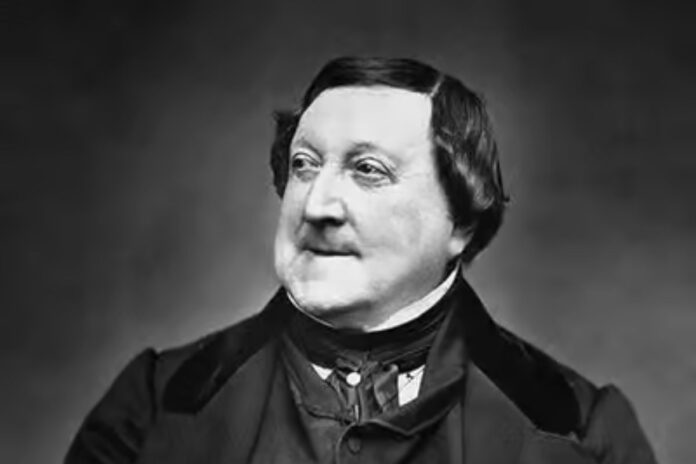Gioachino Antonio Rossini (29 February 1792 – 13 November 1868) was an Italian composer renowned for his 39 operas, which helped define both comic and serious opera during the early 19th century. In addition to his operas, Rossini composed songs, chamber music, piano pieces, and sacred music. He set new standards in the opera world, particularly through works such as *The Barber of Seville* and *William Tell*. Despite his widespread success, Rossini retired from large-scale composition at the height of his fame in his thirties, leaving a lasting legacy in the world of classical music.
Introduction
Gioachino Rossini is a name that resonates with anyone who appreciates the elegance and drama of opera. Known for his dazzling melodies, witty compositions, and larger-than-life personality, Rossini is regarded as one of the most influential composers in the history of classical music. Whether you’ve heard his famous The Barber of Seville or enjoyed his William Tell Overture, there’s no denying Rossini’s impact on the world of music. In this article, we’ll dive deep into his life, his most iconic works, and his lasting legacy that continues to inspire musicians today.
The Early Life of Gioachino Rossini
Born to a Musical Family
Gioachino Antonio Rossini was born on February 29, 1792, in Pesaro, Italy. From a young age, Rossini was immersed in the world of music. His father was a singer, and his mother was a talented pianist, ensuring that Rossini had an early introduction to the world of classical music. His musical journey began when he enrolled at the Bologna Conservatory at just 14 years old, where he honed his skills and developed a lifelong love for opera.
A Prodigy in the Making
Rossini’s early talent did not go unnoticed. By his late teens, he had already composed several works, including operas that were performed in Italy’s prestigious theaters. His early works displayed the wit and charm that would come to define his later compositions. It wasn’t long before Rossini became the darling of Italy’s opera scene.
Rossini’s Major Works and Contributions to Opera
The Barber of Seville: A Masterpiece of Comedy and Music
The Barber of Seville (Il barbiere di Siviglia), composed in 1816, is perhaps Rossini’s most famous work. This opera, brimming with humor, romance, and unforgettable melodies, is one of the most performed operas in the world today. The aria Largo al factotum and the overture are just a few examples of Rossini’s ability to blend technical brilliance with emotional depth.
- Fun Fact: Despite its initial mixed reception, The Barber of Seville eventually became a defining work of the operatic comedy genre, cementing Rossini’s place as a master composer.
William Tell Overture: A Symbol of Heroism
Another one of Rossini’s iconic works is the William Tell Overture, composed in 1829. Famous for its stirring final section, which became the theme song for television’s The Lone Ranger, the overture epitomizes Rossini’s gift for creating powerful, evocative music.
- Quick Tip: Even if you’re not familiar with the full opera, the William Tell Overture is instantly recognizable, often used in movies and sports events.
The Stabat Mater: A Work of Spiritual and Emotional Depth
While Rossini was best known for his operas, his Stabat Mater, composed in the 1830s, shows a different side of the composer. This sacred work, full of emotion and grandeur, marks a departure from his more light-hearted operas and highlights his versatility as a composer.
Rossini’s Influence on Classical Music
A New Era for Opera
Rossini revolutionized opera by blending bel canto techniques with dramatic elements, creating music that was both beautiful and emotionally powerful. His use of orchestration, especially in his overtures and finales, set a new standard in the world of classical music.
Shaping the Future of Italian Opera
Rossini’s works influenced composers like Verdi and Donizetti, who would go on to define Italian opera in the 19th century. He is often credited with laying the foundation for the golden age of Italian opera.
A Global Impact
While his primary focus was opera, Rossini’s compositions transcended borders. His works were celebrated not just in Italy but across Europe, and they continue to be enjoyed by classical music lovers worldwide.
Fun Facts About Gioachino Rossini
- Retirement at Age 37: After composing over 30 operas, Rossini famously retired from opera composition at the age of 37, though he continued to write chamber music, piano pieces, and even culinary works.
- A Culinary Passion: Rossini was a known gourmand, and it’s said that his love of food was so intense that he inspired the creation of many dishes, including Tournedos Rossini, a luxurious beef dish topped with foie gras.
- A Playful Personality: Rossini had a reputation for his witty and sometimes mischievous behavior. His sense of humor often found its way into his music.
Frequently Asked Questions (FAQ)
1. Why did Rossini retire from composing opera?
Rossini retired from composing operas at a young age, likely due to the pressures of his demanding career, as well as a desire to explore other interests, including cooking and writing.
2. What is Gioachino Rossini most famous for?
Rossini is most famous for his operas The Barber of Seville, William Tell, and The Italian Girl in Algiers. These works showcase his brilliance in both melody and orchestration.
3. Did Rossini influence other composers?
Yes, Rossini’s innovations in opera, particularly his approach to overtures and dramatic music, influenced future composers such as Giuseppe Verdi and Gaetano Donizetti.
Wrapping Up: Rossini’s Enduring Legacy
Gioachino Rossini’s impact on classical music is undeniable. From his lively and humorous operas to his more reflective and dramatic works, he left a lasting legacy that continues to influence the world of music. His mastery of melody, orchestration, and character development makes him a timeless figure in the classical world. Whether you’re an opera aficionado or a casual listener, Rossini’s compositions are sure to captivate and inspire.




